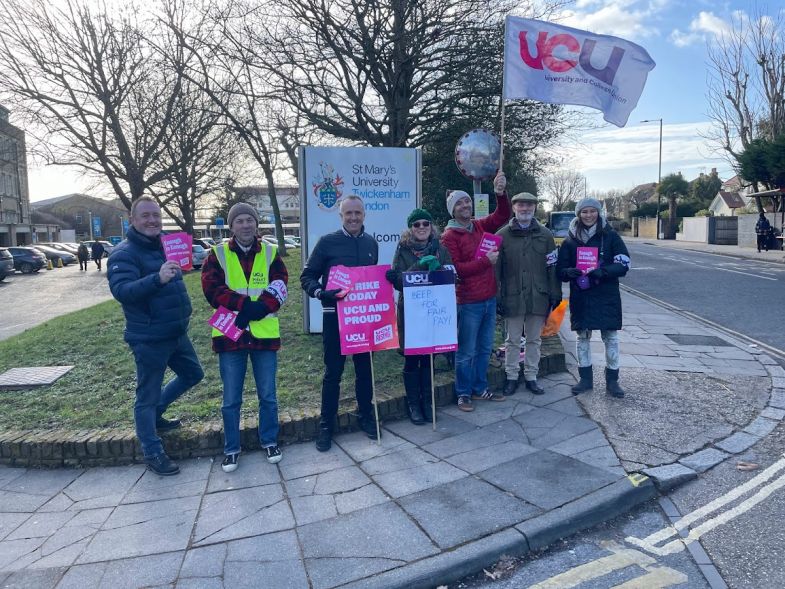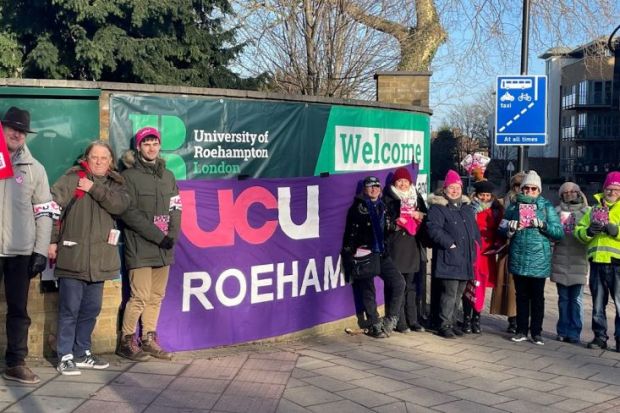University management “don’t understand what staff are going through” and can invest in employees if they rethink their priorities, union members stressed as they began an unprecedented 18 days of strikes.
Institutions across the country faced disruption as the industrial action got under way, with city centres from Glasgow to London filling with striking university workers, joining teachers and those from other sectors who had also walked out.
The University and College Union said it had received “massive support” on the picket lines but employers claimed the strikes were having a “low and isolated impact”.
Attempts to avert the strikes had been made by the Universities and Colleges Employers Association (Ucea), which upped its pay offer for staff from between 4 and 7 per cent to between 5 and 8 per cent.
But UCU general secretary Jo Grady told a picket line outside the London School of Economics that, in an indicative vote, 80 per cent of its members had rejected this.
At the University of Roehampton, staff said the sense that employers were prepared to move on their demands gave the strike a more optimistic feel compared with previous actions.
The fact that industrial action was affecting large swathes of the country showed that the grievances were not the isolated concerns of one group of individuals but indicative of the way people across the board have been treated, said Mark Riley, programme convener for photography at Roehampton and acting chair of its UCU branch.
He said he was personally getting paid 20 per cent less than he was 10 years ago and those left in the institution were feeling the impacts of a large restructuring programme that took place last year.
“Staff are drained and stressed and anxious, and there’s no real sense that universities individually and collectively care about their well-being,” Dr Riley said.
While he felt striking for 18 days would be worth it for a good result in the negotiations, he admitted that it would be “tough” on staff and students.
The branch was also engaged in a local dispute about workload, which Dr Riley said was a result of reductions in the number of permanent staff and increased casualisation following the restructure.
“The managers here don’t seem to understand what staff are going through. A lot of the staff left last year and those still here are really struggling.”
Andy Ridley, a lecturer in art psychotherapy, said he could no longer “carry on” working in the same conditions.
“We are working weekends and evenings. The workload stress means people are off sick or leaving, there’s a huge turnover at the moment and a generally a feeling of demoralisation.”
“There’s no doubt it has an effect on students and that’s regrettable but where do we go when we feel we can’t do our jobs any more?”
Mr Ridley said although the institution had experienced financial difficulties, it had invested in “expensive libraries and new buildings” when what was needed was investment in staff.

At St Mary’s University, Twickenham, many staff were striking for the first time.
“People have been so crushed for so many years. They are saying there must be something we can do,” said Stuart Oliver, the UCU branch chair.
The institution has also experienced financial difficulties and there were 115 redundancies in 2018, with departments including geography and philosophy closing entirely.
Dr Oliver said managers were “dealing with very difficult circumstances” but academic staff had been seen as a “drain on resources” while spend on buildings and the senior team had increased.
Many in the branch would be unable to take the full 18 days’ action, Dr Oliver conceded, but it was looking at the possibility of “rolling strikes” so at least some staff members would be off every day when action is planned.
Ucea said initial feedback from employers had confirmed “all HE institutions are open and operational with only isolated lectures impacted”.
Its chief executive, Raj Jethwa, said he felt this was an “indication of staff reaction to the final pay offer” and called on UCU to “be realistic” about what is achievable, adding that the offer was as far as employers can go.
“At Ucea’s level of uplift we know that a number of [higher education institutions] will struggle financially,” Mr Jethwa said.
“UCU members are being dragged to the top of a hill with no way down and docked pay for [industrial action] counteracts the very reason for this early pay offer – a genuine attempt to address cost-of-living pressures as soon as possible for all staff.”
Register to continue
Why register?
- Registration is free and only takes a moment
- Once registered, you can read 3 articles a month
- Sign up for our newsletter
Subscribe
Or subscribe for unlimited access to:
- Unlimited access to news, views, insights & reviews
- Digital editions
- Digital access to THE’s university and college rankings analysis
Already registered or a current subscriber? Login








